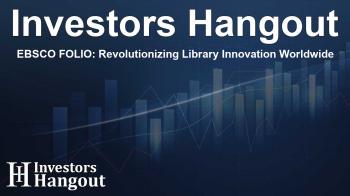EBSCO FOLIO: Revolutionizing Library Innovation Worldwide

EBSCO FOLIO Unites Libraries Through Open-Source Innovation
Leading the way in library technology, EBSCO FOLIO is becoming a hub for over 300 libraries worldwide. This open-source platform is designed to evolve with libraries, helping them deliver exceptional services and adapt to the changing needs of users.
Growing Enthusiasm for Open-Source Collaboration
As institutions across the academic, research, and national library sectors adopt EBSCO FOLIO, the commitment to open-source collaboration has never been stronger. By encouraging innovation at scale, FOLIO is reshaping the library landscape, creating a community-driven approach that enhances the way libraries operate.
Notable Institutions Join the Movement
Among the prominent libraries participating in this initiative is the renowned Library of Congress, which has recently unveiled its Library Collections Access Platform built on FOLIO. By leveraging EBSCO Information Services' support, the library can implement improvements that will benefit its operations and be shared with the broader community, illustrating the power of open-source solutions.
Trust and Flexibility Drive Implementations
From liberal arts colleges to prestigious Ivy League universities, institutions are increasingly trusting EBSCO to guide them in their journey to utilize FOLIO effectively. Recent implementations reflect a trend toward enhancing library management systems, with institutions like Le Moyne College and Columbia University leading the charge. This diverse array of libraries showcases how EBSCO’s services can be tailored to fit unique needs while maximizing the potential of the FOLIO platform.
Consortia: Pillars of FOLIO Growth
As the backbone of FOLIO's expansion, consortia play a vital role in promoting collaboration among their member libraries. The complexity of these implementations highlights the adaptability of EBSCO FOLIO as it meets the distinct requirements of varying library types. Under the guidance of organizations such as MOBIUS and SCELC, members demonstrate how open-source frameworks can thrive, fostering increased access to knowledge and resources.
Voices of Support from Leaders
Thought leaders like Donna Bacon and Teri Oaks Gallaway emphasize the transformative nature of partnerships with EBSCO. By enhancing collaboration across networks, they highlight how EBSCO FOLIO paves the way for scalable innovation tailored to institutional needs.
The Role of EBSCO in Ensuring Success
According to Anya N. Arnold, the Global Director of FOLIO Implementation Services at EBSCO, every new implementation strengthens the FOLIO community. The open-source nature of the platform offers libraries greater control and transparency, enabling operational flexibility. Additionally, EBSCO’s implementation and hosting services remove the burden of staffing and development requirements for institutions, allowing them to focus on their core missions.
Innovations for the Future of Libraries
As EBSCO continues its commitment to advancing FOLIO, ongoing contributions help foster community-led priorities. Initiatives like a linked data editor being developed for the forthcoming Trillium release demonstrate EBSCO’s dedication to ensuring innovations meet the diverse needs of libraries globally. Moreover, enhancements aligned with the new Eureka architecture will further cement the platform’s role as an essential tool in modern library management.
About EBSCO Information Services
EBSCO Information Services (EBSCO) is a global leader in providing advanced online research content and innovative search technologies. By serving libraries, healthcare institutions, and government agencies, EBSCO enables access to comprehensive resources that address the varied needs of their users. With a strong focus on AI-driven solutions, EBSCO stands at the cutting edge of the information services landscape, continually adapting to support customer needs.
Frequently Asked Questions
What is EBSCO FOLIO?
EBSCO FOLIO is an open-source library services platform designed to meet the evolving needs of libraries around the world.
How many libraries use EBSCO FOLIO?
Currently, over 300 libraries have implemented EBSCO FOLIO, showcasing its growing acceptance and trust among diverse institutions.
What are the benefits of open-source platforms like FOLIO?
Open-source platforms enhance collaboration, transparency, and flexibility while allowing libraries to adapt solutions to their specific needs.
Which notable institutions have adopted EBSCO FOLIO?
Prominent institutions such as the Library of Congress and Columbia University have embraced EBSCO FOLIO to enhance their library infrastructures.
What role does EBSCO play in the FOLIO community?
EBSCO supports implementation, hosting, and development resources, ensuring the ongoing success and evolution of the FOLIO platform for libraries.
About The Author
Contact Hannah Lewis privately here. Or send an email with ATTN: Hannah Lewis as the subject to contact@investorshangout.com.
About Investors Hangout
Investors Hangout is a leading online stock forum for financial discussion and learning, offering a wide range of free tools and resources. It draws in traders of all levels, who exchange market knowledge, investigate trading tactics, and keep an eye on industry developments in real time. Featuring financial articles, stock message boards, quotes, charts, company profiles, and live news updates. Through cooperative learning and a wealth of informational resources, it helps users from novices creating their first portfolios to experts honing their techniques. Join Investors Hangout today: https://investorshangout.com/
The content of this article is based on factual, publicly available information and does not represent legal, financial, or investment advice. Investors Hangout does not offer financial advice, and the author is not a licensed financial advisor. Consult a qualified advisor before making any financial or investment decisions based on this article. This article should not be considered advice to purchase, sell, or hold any securities or other investments. If any of the material provided here is inaccurate, please contact us for corrections.

